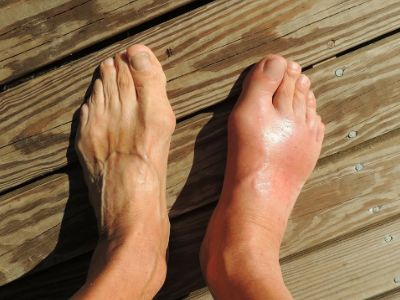Gout is a common and complex form of arthritis that can affect anyone. It is characterized by sudden, severe attacks of pain, swelling. Gout is a general term for a variety of conditions caused by a buildup of uric acid. Obesity is a strong risk factor for the development of gout.
An attack of gout can occur suddenly, often waking you up in the middle of the night with the sensation that your big toe is on fire. The affected joint is hot, swollen and so tender that even the weight of the bedsheet on it may seem intolerable. Gout symptoms may come and go, but there are ways to manage symptoms and prevent flares.

Symptoms of Gout
- Intense joint pain. Intense joint pain. Gout usually affects the big toe, but it can occur in any joint. The pain is likely to be most severe within the first four to 12 hours after it begins.
- Lingering discomfort. After the most severe pain subsides, some joint discomfort may last from a few days to a few weeks.
- Inflammation and redness. The affected joint or joints become swollen, tender, warm, and red.
- Limited range of motion. As gout progresses, you may not be able to move your joints normally.
What are the Five Ways to Relieve Gout Pain?
- Take an NSAID. Over-the-counter non-steroidal anti-inflammatory drugs can help relieve gout pain. Avoid aspirin and other medications that contain acetylsalicylic acid as it worsens gout pain.
- Take your prescription medications. Your medications are your first line of defense against future attacks of out pain. Note that Opioid painkillers, such as codeine, hydrocodone, and oxycodone, are not recommended to treat the pain caused by gout.
- Apply ice to the affected area. Cold therapy can offer significant pain relief by decreasing inflammation and dulling pain signals. If this treatment works for you, you can apply the cold pack for 10 minutes.
- Elevate the joint. Propping up the affected joint can ease pressure and reduce pain. You can use a pillow or stool to alleviate pain. Rest the affected joint and keep pressure off it until your pain subsides.
- Drink more water. Hydration will help flush the uric acid from your system. Aim for drinking 8 glasses a day. Stay away from alcohol and processed beverages to prevent a gout attack.
Does Weight Loss Helps Reduce Gout Pain?
Rheumatology recommends a couple of lifestyle modifications for preventing future attacks of gout. Obesity can increase uric acid levels as well as put pressure on the joints. Following a healthy diet such as the HCG diet is an effective way to reduce uric acid levels is to follow a low-purine diet. Following the HCG diet means avoiding “alcohol, shellfish, red and fatty meat, and high fructose corn syrup. Limiting these foods is also beneficial for heart health.
Why Choose the HCG Diet?
HCG in general is a hormone from a pregnant woman. This is been used to lose weight by thousands of people for years. HCG is designed to suppress hunger and curbs cravings as it burns unwanted fat. HCG works rapidly in weight loss along with the Very low-calorie diet. This is a safe diet protocol that follows a healthy lifestyle for the benefit of the dieter.






















